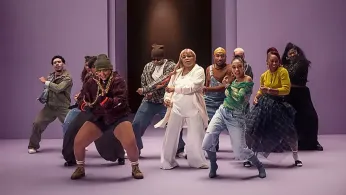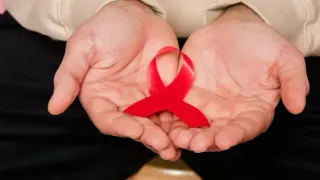
3 hours ago
T-Boz Transforms TLC's "Creep" Into a Powerful PrEP Anthem
READ TIME: 4 MIN.
When TLC released "Creep"in 1994, the R&B trio wasn't just delivering a smooth, seductive earworm—they were establishing themselves as artists willing to address the messy, complicated realities of desire, infidelity, and female agency from a distinctly Black feminine perspective. Written and produced by Dallas Austin, the track became TLC's first No. 1 hit on the Billboard Hot 100, holding the top position for four weeks and eventually securing a Grammy Award for Best R&B Performance by a Duo or Group with Vocals.
But "Creep" was more than just a chart success. The song's music video, directed by Matthew Rolston and featuring the now-iconic satin pajamas aesthetic, became a cultural touchstone that defined '90s visual style and female sexuality on screen. Yet what made TLC truly revolutionary was their commitment to using their platform for more than entertainment. The group's 1995 hit "Waterfalls" directly addressed the AIDS epidemic, a move that was both bold and necessary during a time when mainstream pop music largely avoided such fraught topics.
That spirit of advocacy—of using music as a tool for education and empowerment—is precisely what T-Boz is channeling with her latest project.
On November 26, 2025, T-Boz unveiled "So We PrEP, "a reimagined version of "Creep" created in partnership with Gilead Sciences as part of their Care for the Culture campaign. The campaign aims to spark open, culturally grounded conversations about HIV prevention within Black communities, where health disparities remain staggeringly pronounced.
The numbers tell a sobering story. According to Gilead, only 14 percent of PrEP users in the United States are Black, despite Black communities accounting for 42 percent of new HIV diagnoses. This gap between need and access represents not just a public health failure but a manifestation of systemic racism within American healthcare—a reality that disproportionately affects Black LGBTQ+ individuals, sex workers, and other marginalized communities.
By transforming one of the most recognizable melodies in R&B history into an anthem centered on empowerment, pride, and protection, T-Boz is doing what TLC has always done best: meeting people where they are culturally and inviting them into a conversation about their own agency and safety.
"In the '90s, we used our platform to speak truth and empower people to love themselves. That mission hasn't changed, " T-Boz stated in a release accompanying the track. It's a powerful reminder that advocacy isn't a trend or a moment—it's a commitment that can span decades.
To understand the significance of this project, it's essential to recognize what made "Creep" culturally important in the first place. The song's narrative—drawn from T-Boz's real-life experiences—centered a woman's perspective on desire and infidelity in a way that was both unapologetic and nuanced. It wasn't a morality tale; it was a story told from the inside, with all the complexity that entails.
That same willingness to engage with complicated realities is what makes "So We PrEP" such a fitting evolution. PrEP—pre-exposure prophylaxis—is a medication that, when taken consistently, can reduce the risk of HIV infection by up to 99 percent for people at high risk. Yet despite its efficacy and availability, access remains unequal, particularly for Black Americans, LGBTQ+ people in rural areas, and other marginalized communities who face barriers including stigma, misinformation, and inadequate healthcare infrastructure.
By placing PrEP messaging within the framework of a beloved cultural artifact, T-Boz is doing something deceptively simple yet profoundly strategic: she's normalizing the conversation. She's saying that talking about sexual health, prevention, and protection isn't shameful or clinical—it's an extension of self-love and self-determination.
The partnership between T-Boz and Gilead reflects a growing recognition within public health that reaching communities most affected by HIV requires meeting them on cultural terms. Generic PSAs and clinical language have their place, but they often fail to resonate with the very people who need the information most. When a trusted cultural figure—someone whose voice has been part of the soundtrack to people's lives—delivers a health message, the impact is fundamentally different.
For LGBTQ+ audiences in particular, this approach carries additional weight. The AIDS crisis of the 1980s and '90s devastated queer communities, and while modern HIV treatment and prevention have transformed the landscape, stigma and health disparities persist. Black LGBTQ+ people continue to face disproportionate rates of HIV infection, and conversations about prevention remain fraught with judgment and shame in many spaces.
By framing PrEP not as a clinical intervention but as an act of self-love and community care, T-Boz is reclaiming a narrative that has often been controlled by others. She's saying: your health matters. Your body matters. Your right to pleasure and safety matters. And you deserve access to the tools that protect both.
The release of "So We PrEP" arrives at a moment when conversations about sexual health, reproductive justice, and bodily autonomy feel increasingly urgent. In a political landscape where LGBTQ+ rights are under sustained attack and healthcare access remains a flashpoint, projects like this one serve as both a cultural moment and a practical intervention.
For longtime TLC fans, the reimagining will likely feel bittersweet—a reminder of how much has changed in three decades, and yet how much remains the same. The group's commitment to addressing real issues through music was revolutionary then; it remains vital now. That T-Boz continues to carry that torch, adapting it for new challenges and new generations, speaks to the enduring power of using art as a vehicle for change.
"So We PrEP" won't solve the structural inequities that have left Black communities underserved by HIV prevention efforts. But it might spark a conversation at a dinner table, in a group chat, or in a doctor's office. It might make someone feel less alone in their concerns about sexual health. It might empower someone to ask their healthcare provider about PrEP. And in the landscape of public health, sometimes those small moments of connection and empowerment are where real change begins.






